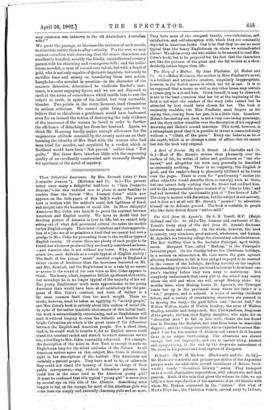Those Delightfil Americans. By Mrs. Everard Cotes (" Sara Jeannette
Duncan "). (Methuen and Co. 6s.)—The present writer owes many a delightful half-hour to "Sara Jeannette Duncan,"—for this untitled nom de plums is more familiar to readers than the formal "Mrs. Everard Cotes" which now appears on the title-pages of this lady's works. The present book is written with the author's usual deft lightness of touch and insight into the humours of social life. In Those Delightful Americans Mrs. Cotes sets herself to paint the contrast between American and English society. We have no doubt that her dazzling picture of America is true to life, but we cannot help asking out of what dull provincial retreat she takes the models for her English couple. Their level of intellect and their apprecia- tion of a joke are of so primitive a kind that we cannot but owe a grudge to Mrs. Cotes for presenting them to the world as types of English society. Of course there are plenty of such people to be found, but wherever produced they are frankly considered as bores, —and America also is not without her bores. Why, therefore, select two such dullards as a couple typical of English society ? The fault of the young "smart" married couple in England is rather excess of liveliness than the heaviness bestowed on Mr. and Mrs. Kemball, and the Englishman is as a rule by no means an averse to the sound of his own voice as Mrs. Cotes appears to think. The heavy, silent, impassive British sportsman still exists, but nowadays he is no longer typical of the majority of his set. The young Englishman much more approximates to the young American than would have been at all satisfactory for the pur- poses of Mrs. Cotes's contrast, and want of ballast is a far more common fault than too much weight. These re- unrks, however, must be taken as applying to "society people," and Mrs. Cotes's book is entirely about this section of social life. In spite of the rather inartistic obviousness of this initial fault, the book is extraordinarily entertaining, and no Englishman will read it without longing to cross the Atlantic and breathe that bright Columbian air which is the great cause of the differences between the English and American people. For a short time, that hi, be would wish to breathe it, for no English nerves could stand the constant racket and stretch to which American nerves are, according to Mrs. Cotes, constantly subjected. For example, the description of the noise in New York is enough to make an Englishman long for the silent solitudes of the Sahara. As all American writers agree on this subject, Mrs. Cotes is obviously right in her descriptions of the hubbub. The Americans are certainly a patient people. They have need to be, or otherwise they could not stand the tyranny of those in charge of their public conveyances,—nay, without bottomless patience who could live in the same land as the American young girl ? It must be confessed that this typical "young girl" is never seen by mortal eye on this side of the Atlantic. Something must happen to het. on the image, for most of the American girls who steno here are simply and naturally charming girls and no more. They have none of the arrogant beauty, over-cultivation, self- satisfaction, and self-absorption with which they are constantly depicted in American books. Can it be that they too are no more typical than the heavy Englishman on whom we animadverted above? We advise every one who wishes to be amused to read Mrs. Cotes's book, but to be prepared for the fact that the characters are, like the pictures of the giant and the fat woman at a show, decidedly rather larger than life.


























































 Previous page
Previous page